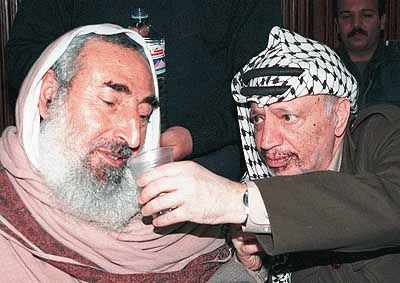It is
ironic that the annual commemoration of the death of Yasser Arafat should turn
into an occasion for rekindling the flames of internal strife. This was clearly
the aim of last week's bombings that targeted the homes of Fatah leaders in Gaza, as well as the
podium for the commemorative ceremonies of Arafat, who strove to make
Palestinian national unity one of the pillars of his political legacy.
How desperately those concerned need to be inspired by the political legacy of that great president.
During a visit to demonstrate solidarity with the West Bank village of Al-Mughayyar, where settlers, under the protective eye of occupation soldiers, set fire to a mosque, Director of the Ministry of Awqaf (Religious Endowments) Kamel Abu Aliya remarked that his ministry have documented 20 similar attacks on mosques in the West Bank since 2011.
In targeting mosques, the occupation is clearly targeting major symbols of national and popular unity. Mosques, by definition, gather people together rather than drive them apart. Inside the mosque all the factions of the national struggle that are at odds with each other assemble as one with their fellow men, in solid ranks with a single heart.
The occupation has never foregone any means at its disposal to drive a wedge into the Palestinian national ranks. This has not changed. So it is ironic that the bombings would become an occasion to present the occupation with the gift of factional polarisation and a war of words, at a time when the factions most need to be united, and that they would serve to turn the national compass away from Jerusalem, on which Arafat had set his national compass until his dying breath.
But here is another important point. Both sides of the dispute -- Fatah and Hamas -- have condemned the attacks, denied all charges of responsibility and insist on the need to conduct an investigation into bombings as quickly as possible.
If these two factions can agree on these points, what would keep them from agreeing to form a joint fact-finding committee that would include representatives from all other factions (most notably the Islamic Jihad and the Popular Front) and independent figures from civil society that would be committed to publishing its findings in fulfilment of the right of the Palestinian people to know the truth?
Moreover, why couldn't the creation of a joint committee such as this become a new mechanism for enhancing national reconciliation and ending acrimonious exchanges before they spiral out of control?
(Note: You can view every article as one long page if you sign up as an Advocate Member, or higher).





